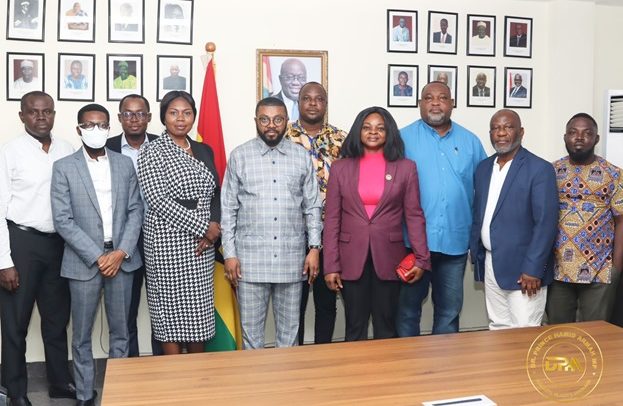Dr. Prince Hamid Armah with some participants of the meeting
Deputy Minister for Works and Housing, Dr. Prince Hamid Armah, has convened key stakeholders to discuss the upcoming Built Environment National Conference on Housing and Hydrology (BENCHH 2024).
The three-day event is scheduled to take place from July 2nd to July 4th, 2024, at the Labadi Beach Hotel.
During these stakeholder meetings, Dr. Hamid Armah provided an in-depth briefing on the objectives of BENCHH 2024.
He emphasized the Ministry’s commitment to organizing the conference as a platform to identify practical solutions for critical hydrology and housing challenges.
The event aims to foster sustainable and resilient development within Ghana’s built environment sector.
The conference, themed “Enhancing Collaboration to Tackle Ghana’s Housing and Hydrology Challenges,” is designed to bring together a diverse group of participants, including researchers, practitioners, financiers, material developers, policymakers, and other stakeholders.
Through moderated panel discussions and collaborative sessions, attendees will explore innovative approaches to industry challenges and develop actionable recommendations to inform policy making.
Dr. Hamid Armah, who is also the Chairman of the BENCHH Planning Committee, highlighted the prevailing issues in Ghana regarding access to decent housing, the housing deficit, and the exorbitant costs driven by demand and supply dynamics.
He stressed that the situation is precarious and requires urgent attention.
The Deputy Minister reminded stakeholders of the constitutional mandate to preserve human dignity, referencing Article 15 of the National Constitution, which underscores the right to decent accommodation as a fundamental human right.
“Access to decent housing is not just a matter of policy but a basic element of human dignity which must be inviolable as enshrined in Article 15 of our national constitution,” Dr. Hamid Armah stated. “Our discussions here are crucial for addressing this important socio-economic issue.”
The conference will focus on creating facilitative conditions that address barriers impeding policy progress.
The outcomes are expected to result in actionable resolutions, potentially leading to the amendment and creation of new policy directions.
A Daily Guide Report


